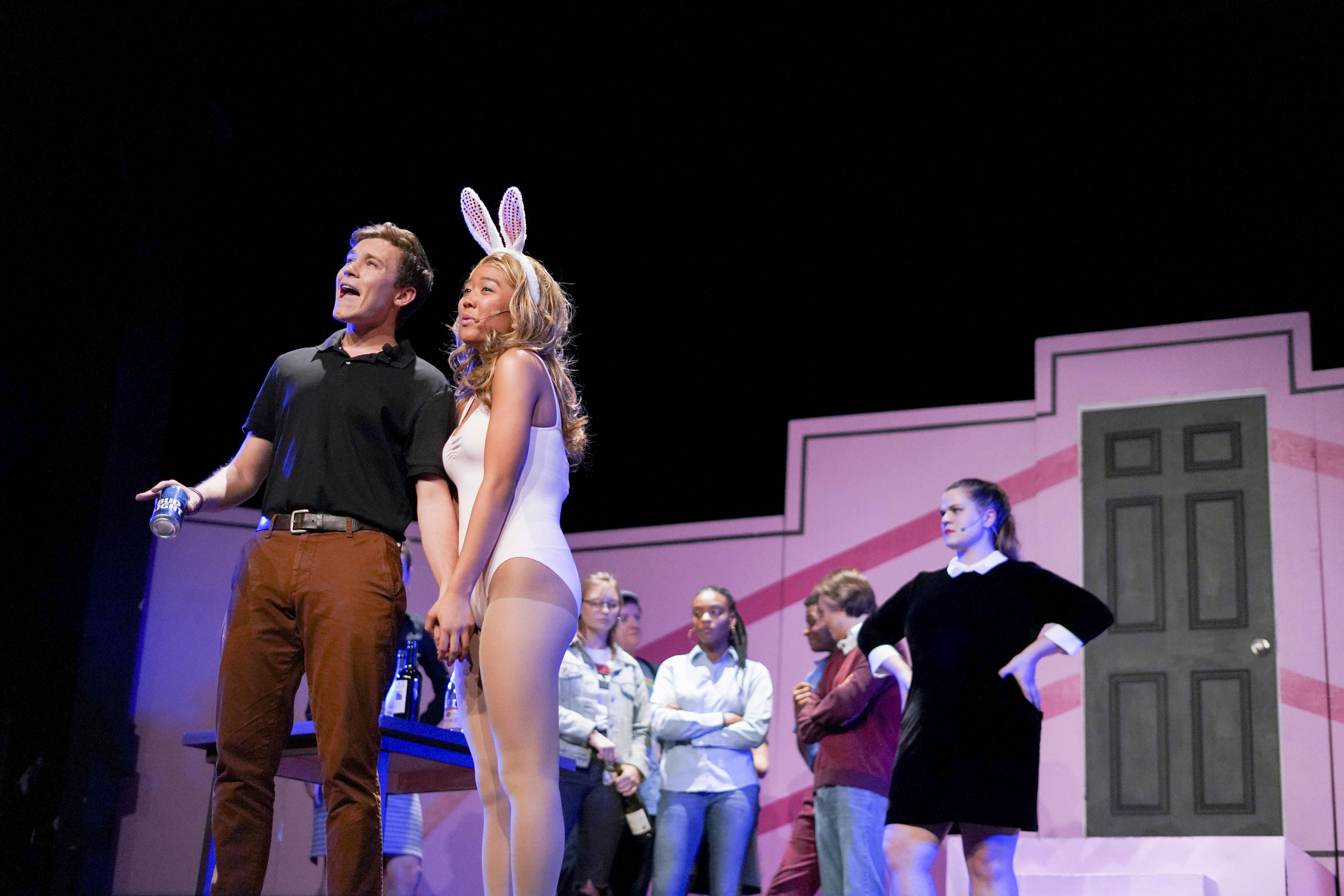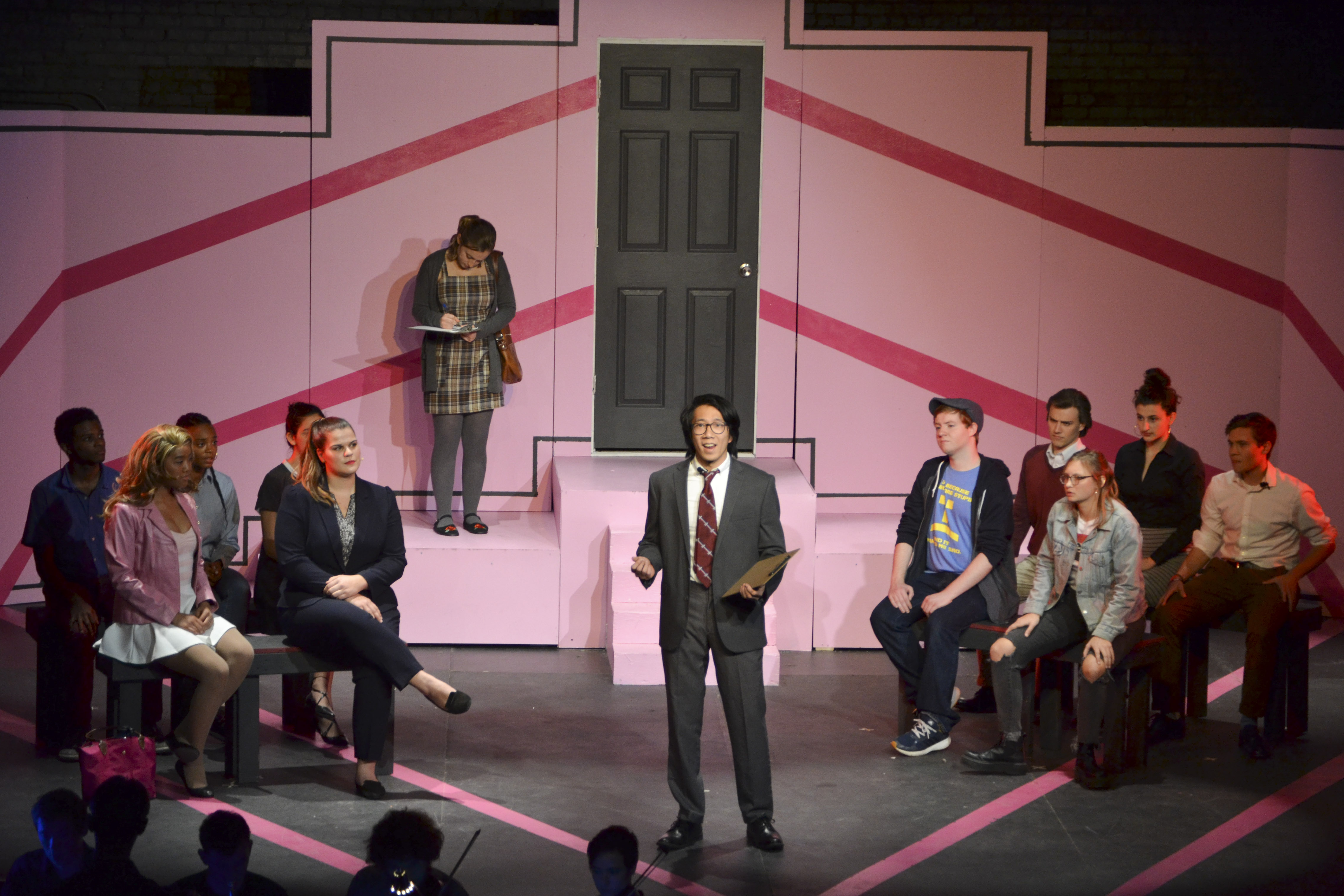
Flinging open a door center stage, Elle Woods (Jolie Villegas ’22) appears in the perfect pink dress, ready to conquer the milestones ahead. In the opening number “Omigod You Guys”—one of the many tunes from “Legally Blonde: The Musical” that you’ll be humming around campus this weekend—Elle has found the perfect dress to wear for what she believes will be the most important day of her life, the day she expects her boyfriend, the pompous Warner Huntington III (Michael Bloom ’21), to propose. In a parallel moment, many scenes and a great deal of character development later, Elle emerges again in an explosion of pink. This time, instead of dressing up to go meet a man who belittles her, she is off to the courthouse to demonstrate her skills as a Harvard Law School–educated defense attorney.
This transformation from naive optimism to empowered positivity commands the heart of Second Stage’s production, which opened in the ’92 Theater last night. The story follows Elle as she embarks on a journey to get back her boyfriend and finds her inner power as a lawyer instead. While on the surface “Legally Blonde,” a musical adaptation of the 2001 movie starring an extremely peppy Reese Witherspoon, is two hours of grand, up-tempo numbers and flocks of squealing sorority members, at its core, the story focuses on women helping other women find empowerment in the male-dominated field of law. As such, the production, directed by Sarah Connolly ’19, not only presents a fun-loving show that will make the audience dance in their seats; it also illuminates a message that is especially poignant in the time of the #MeToo movement.
If the show’s heart is its nuanced exploration of topical issues through thoughtful blocking and diverse casting, its backbone would most definitely be the unfaltering energy of the cast. Despite the difficult score, which barely gives performers time to catch their breath between numbers that are both vocally demanding and highly choreographed, the leads and ensemble bring the necessary vigor to each song. With commendable choreography by Karolina Hetesova ’19, elaborate numbers such as “What You Want” and “Bend and Snap” sparkle with captivating positivity. Even with the occasional musical faux pas in the larger numbers, the engagement in every movement on stage made the audience eager to applaud at the end of each song.

Although many of the leading performers’ portrayals partially echo some characteristics of actors from the original film, many of the actors approach the characters from fresh angles. Villegas as Elle brings a sweetness and earnestness reminiscent of Witherspoon’s performance, as well as impressive vocal stamina. Yet she also makes the character her own, incorporating a believable vulnerability and elegance that, despite not being traits usually associated with the character, work well with Elle’s journey to empowerment.
Alex O’Shea ’19 as Emmett, Elle’s romantic interest, gives undoubtedly one of the best performances of the show, with strong vocals and impeccable acting that creates a character who both foils Elle and lifts her up. Instead of being simply a replacement for Elle and Warner’s relationship, Emmett’s budding relationship with Elle becomes something entirely new and special in itself. Emmett is the character in the show who sees Elle for all that she is and all she can be, and the representation of a queer relationship onstage reinforces the inclusive nature of this production. Elle and Emmett are strong apart and strong together, compelling the audience to root for both of them to find success in addition to love.
Similarly, the actors portraying an eccentric array of minor characters give convincing performances. Bloom’s skillful portrayal of Warner as more ignorant than outright vindictive allows the audience to have more compassion for the heartbreak that spurs Elle to apply to Harvard Law. Vienna Kaylan ’19 as Paulette, a hairdresser who quickly becomes good friends with Elle and finds her own empowerment through their friendship, has perhaps the best comic timing of the show while never turning her character into a caricature. Thea LaCrosse ’21 as Vivienne, Warner’s new girlfriend whom Elle describes as an “evil preppy,” brings a fitting coldness for the majority of the production, but the character evolves to play a support figure to Elle, all while delivering impressive belting during multiple musical numbers. Yael Yossefy ’22 as Brooke, the head of a fitness emporium convicted of murdering her husband, gives a thoroughly invigorating performance, singing flawlessly as she jumps rope in an orange jumpsuit. The ensemble cast of sorority members (gals and guys included—an honorable nod to Wesleyan’s co-ed Greek life) and law school students keep the audience engaged with high levels of spunk and charisma. It’s easy to tell those on stage are all having fun, and the fun is certainly contagious.
On the tech side, the show appears to run effortlessly, which of course is a testament to the crew’s tremendous efforts. The set, designed by Daniel Gordon ’19, is relatively simple but versatile nonetheless, and the costumes, designed by Tina Omoeva ’21 match the colorful energy of the show. (And bravo for all the quick changes—this show has a ton of quick changes!) Lighting, designed by Matt Grimaldi ’21 complements the mood while nicely accenting big moments for the characters. The live pit was absolutely necessary and handles the challenging score gracefully.

Much of the show’s power can also be attributed to Connolly’s directorial choices, specifically in casting that highlights different dynamics in relationships between strong female characters. Additionally, the directorial and acting choices made concerning the subplot of Elle’s infamous law professor, played with frighteningly realistic creepiness by Franklin Gu ’20, kissing a female student without consent leaves a lasting impact. This impact is heightened as the audience watches Elle find support in Vivienne, Paulette, and especially in O’Shea’s Emmett. Characters like Professor Callahan are all too recognizable, and watching a group of powerful women take him down has never been more satisfying.
As with any show, minor details could be improved. The dialogue between songs feels rushed at times, though the difficulty of finding the pacing of a script filled with easily excitable characters has to be acknowledged. The live orchestral pit contributed to the high energy of the show during numbers, but not having the pit play during set transitions interrupts the momentum between scenes. And then there’s the problem of Second Stage’s limited access to microphones, which makes the many fast lines delivered by ensemble members difficult to catch. Overall, none of these minor drawbacks impede the outstanding quality of the production.
Besides the catchy songs, what will most likely stay with the audience of “Legally Blonde” long after they leave the theater is the show’s spirit. The production not only captures Elle’s optimism with a technically impressive show, but elevates the message by making the story much more inclusive and applicable to women facing any obstacle. Performed in the current political moment, “Legally Blonde” is an unexpected ray of hope. The confidence and positivity Elle inspires is no longer just something encapsulated in sororities; it is more recognizable in the Women’s Marches taking place across the country. The diversity of the cast furthers this parallel, as the production’s inclusivity reminds the audience of the importance of intersectionality in feminism. When women from all backgrounds help each other overcome challenges, they rise up and find success together.
Sara McCrea can be reached at smccrea@wesleyan.edu.













Leave a Reply